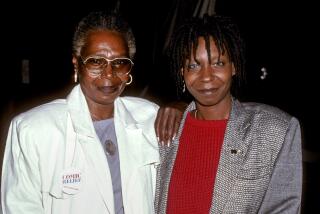Albert Goldberg: An Appreciation
- Share via
Albert Goldberg, who died on Sunday, wasn’t like other music critics.
He served time, early in his distinguished career, as a pianist and conductor. He lived with music and for music, with a little time out for decent literature and fine food.
Unlike some of us, he didn’t like going to movies on a free night. He switched on his infernal, newfangled television set only under duress and then only with careful, often futile instruction.
He couldn’t stop learning about the things he deemed important. He considered a biography of Franz Liszt good bed-time reading. Only a few months ago, he called to chat about his excitement at rediscovering some ancient recordings by Enrico Caruso. Tenors today, he muttered, don’t have that sort of dynamic finesse.
He couldn’t stop writing. He typed his last piece for this paper--a perceptive review of Zubin Mehta and the Israel Philharmonic--on March 21, 1989. That was three months before his 91st birthday.
We didn’t know at the time that this would be his critical swan song, but the subject turned out to be apt. He had been one of Mehta’s earliest, staunchest and most persuasive supporters.
Albert always attended concerts even when he didn’t have to. He went eagerly. He went compulsively. That probably helped keep him young.
He could remember Kreisler, but was curious about Anne Sophie Mutter. He grew up with Toscanini and, formatively, with Frederick Stock, but wanted to know all about Esa-Pekka Salonen. He recalled Paderewski and worshipped Horowitz, but mustered great interest in Jean-Yves Thibaudet.
His aesthetic priorities were wonderfully quirky. A discerning romanticist from Shenandoah, Iowa, he tended to find Bach dry, “Figaro” long, modern music unpleasant. Yet he was always willing--and pleased--to be surprised. His sense of humor did not preclude occasional excursions into self-mockery.
He was, essentially, a gentleman of the old school. He respected common courtesies, and uncommon ones too. No one confused him, however, with the the traditional mild-mannered reporter. He once engaged none less than Igor Stravinsky in a feisty public battle of wits and priorities. In the distant past when the extramusical powers at The Times attacked Georg Solti--then the beleaguered and short-lived music director of the Los Angeles Philharmonic--Albert refused to toe the line. He kept his integrity.
He was a stylist. His deceptively gentle prose revealed elegance, balance, point.
He was a scholar. He knew far more about the piano, about pianists and about the piano literature than most of us could ever hope to know.
He also was a generous colleague. When in 1965 he reached official retirement age--actually he had exceeded it by a couple of years--he had to contend with a brash young writer from New York invading what had been his turf. Others in his position might have registered resentment. Others might have withdrawn and waited gleefully for the foolhardy newcomer to make an ass of himself.
Albert Goldberg did nothing of the kind. He stepped aside, offered help and voiced encouragement.
A quarter of a century later, the foolhardy newcomer still thanks him for that.
More to Read
The biggest entertainment stories
Get our big stories about Hollywood, film, television, music, arts, culture and more right in your inbox as soon as they publish.
You may occasionally receive promotional content from the Los Angeles Times.










